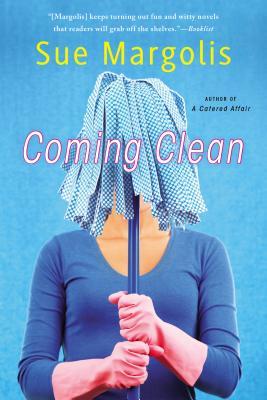October 15, 2013 by Yona Zeldis McDonough
Who Takes Out the Trash?
 With her bright red hair and snap fire one-liners, British author Sue Margolis is a force. Margolis, who has ten books to her credit and over half a million copies in print, has clearly struck a chord and is in perfect synch with her largely female readership. She delivers funny, brassy comedies that still manage to get at some of the key issues facing women today. In Coming Clean, she tackles the age-old dilemma of who takes out the trash, who does the laundry and who mops the floors—and what it all means.
With her bright red hair and snap fire one-liners, British author Sue Margolis is a force. Margolis, who has ten books to her credit and over half a million copies in print, has clearly struck a chord and is in perfect synch with her largely female readership. She delivers funny, brassy comedies that still manage to get at some of the key issues facing women today. In Coming Clean, she tackles the age-old dilemma of who takes out the trash, who does the laundry and who mops the floors—and what it all means.
On a recent visit to New York City, Margolis sat down with Fiction Editor Yona Zeldis McDonough to chat about her life as a radio reporter and as a ladle-brandishing Jewish grandma, and why Seinfeld tanked in the UK.
YZM: With her dead bubbe Yetta, your character Sophie is clearly Jewish. Are all your protagonists Jewish women?
SM: Not all, but most. That way, I get to do what I enjoy most, writing about crazy Jewish families like the one I came from. It’s the glorious, comical-without-realizing-it matriarchs I remember most of all. I love bringing these elderly Jewish mothers–the ladle-waving yentas who used to breastfeed their children matzo balls–back to life.
YZM: You’ve said that the Jewish content of your books does not go over that well in the UK; can you say more about that?
I think maybe what many Americans don’t appreciate–because they’re so familiar with it–is that their humor is Jewish humor. Seinfeld is the most popular US sitcom ever, so I’m guessing that nearly everybody over there [meaning in the U.S.] ‘got’ it. When the show aired in the UK–late at night–people were baffled and left scratching their heads. Jewish humor has never had the same impact over here as it’s had in the States. In the UK there has always been a strong and well-established tradition of regional (predominantly northern) working class comedy. I think it was hard for Jews to break onto the scene–although some did and became moderately successful. Meanwhile in the US, in the early decades of the last century, Hollywood–not to mention musical theatre–was hungry for producers and writers–many of whom turned out to be young Jewish immigrants who were just as hungry. And so it grew.
YZM: What kind of Jewish upbringing did you have? Is your family observant?
SM: We were vaguely observant until my brother’s bar mitzvah. After that my parents stopped worrying if the silverware got mixed up and pretty soon bacon started to appear in the fridge. My sense of ‘Jewishness’ came much more from Habonim (the Zionist youth group) which I joined when I was about fifteen. It was here that I learned Jewish history, not to mention the Hebrew songs I sang to my children when they were small. Now I sing them to my baby granddaughter.
YZM: You’ve worked as a journalist; how did you get your start as a novelist?
SM: I spent fifteen years working as a freelance reporter for a BBC radio program called Woman’s Hour. It’s been around since the Forties and is a real institution over here. The program manages to be serious and thoughtful – discussing and reporting on issues that concern women in the west and the developing world – but it’s also funny. That’s where I came in. I used to contribute most of the lighthearted features. But I’d always wanted to write–to be funny in print. So in the end I decided to stop talking about it and get on with it. I simply quit the BBC and took the biggest risk of my life. My first novel–Neurotica–was published a year later.
YZM: Your husband is journalist; what is it like being married to a fellow writer?
It’s fine. There’s never any competition. No honestly, there really isn’t. I write novels. He writes for newspapers – mostly about technology. If there’s a problem it’s mainly that our house is always full of boxes. Gadgets for review are constantly being delivered. They disappear eventually, but meanwhile I’m forever tripping over 3D printers or the latest dual docking audio system.
YZM: Which comes first for you: plot or character?
SM: Plot every time. A writer has to have a tale to tell. Story is all.
YZM: Have your novels changed and grown along with you?
SM: Possibly not, but I think they’re about to.
YZM: What’s next on your horizon?
SM: I think what I’ve realized as I get older is that I can’t keep writing convincingly about the lives of thirty-something women. I think it’s a mistake for older authors to keep doing this. You may not realize that you’re losing touch with the younger generation, but you are. Your references are all wrong. You’re not up with the Zeitgeist. So if all goes to plan, I shall be withdrawing gracefully from the world of yummy mummies to concentrate on gorgeous (and very modern) grannies.
 Please wait...
Please wait...